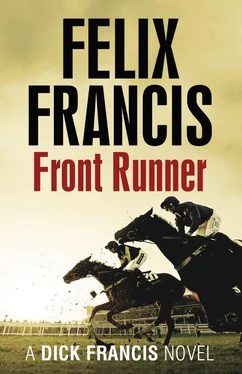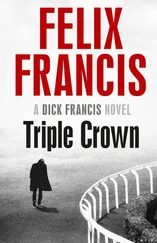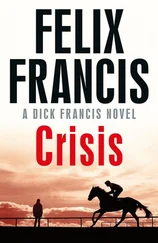I also knew how to stop someone bleeding to death when their foot was blown off by a landmine — I’d had to do that once too.
Bill McKenzie was far from happy when I climbed up into the ambulance after him.
‘Can’t you leave me alone?’ he whined.
The female paramedic in the back looked at me.
‘Ignore him,’ I said to her. ‘I’m here representing the British Horseracing Authority.’ I showed her my credentials.
‘Sit there,’ she said, pointing at a seat. So I did, as Bill McKenzie was transferred from the wheeled chair to a stretcher. Then the doors were closed, and off we went.
‘Don’t I get the bleeding bells and whistles?’ McKenzie said with disappointment as the ambulance turned silently into the traffic on Portsmouth Road.
The paramedic smiled at him. ‘It’s not an emergency,’ she said. ‘You’re not in any immediate danger of dying.’
He didn’t seem particularly reassured. With good reason.
‘Now,’ I said, ‘tell me about Wisden Wonder in yesterday’s novice hurdle.’
‘Bloody nag dumped me on the ground and kicked me, didn’t he? I’ve got a right sore head, I can tell you.’ He reached up with his right hand and touched behind his right ear.
‘You fell off,’ I said accusingly, hoping for a response.
‘You try staying on a bloody horse when it doesn’t even try to jump. Wisden Wonder was damn lucky not to fall proper and do himself some serious mischief.’
‘You didn’t give him any chance to jump,’ I said. ‘I’ve watched the videos over and over. You covered him up and made him run straight into that hurdle on purpose.’
‘Now, why would I do that?’ he asked. ‘Do you think I enjoy being thrown to the ground at thirty miles an hour and then kicked for my troubles? It bloody hurt.’
I feared I was getting nowhere. If he went on denying it, there would be little I could do. I couldn’t actually prove that he’d come off intentionally, although I was sure he had.
‘Do you know a racehorse owner called Leslie Morris?’
‘No,’ he said. ‘Never heard of him.’
He tried his best to control his expression but there was a telltale widening of the pupils in his eyes and an involuntary slight flushing at the base of his neck. He knew Morris, all right.
‘How much did he pay you?’ I asked.
‘No one paid me anything.’
‘So why did you do it?’
‘I didn’t,’ he said, this time in more control. He leaned back onto the pillows and closed his eyes. ‘Can’t you get this thing to go any faster? My bloody shoulder’s killing me.’
‘Are you being blackmailed?’ I asked.
‘Blackmailed?’ he repeated with apparent surprise.
‘No more questions,’ said the paramedic bossily to me. She gave Bill a tube attached to a mouthpiece with which to suck in some painkilling gas.
I hoped it might also act as a truth drug.
I never did get back to Derrick and Gay Smith’s box for afternoon tea, as I spent the next three hours at Kingston Hospital with Bill McKenzie.
The X-ray confirmed that he had, indeed, broken his collarbone and I silently berated myself for not having fully believed it. Perhaps I would have been slightly more sympathetic if I had realized he wasn’t just trying to find another way of avoiding having to talk to me.
In fact, the break was pretty severe with the ends of the bones overlapping, so surgery was needed to realign them, and to have a plate and screws fitted to keep it that way.
I sat next to him as he lay on a trolley in a curtained-off emergency cubicle while we waited for the on-call orthopaedic surgeon to be roused from his Saturday-afternoon slumbers.
‘If you are not being blackmailed,’ I said, ‘why did you do it?’
‘I didn’t do anything,’ he said for the umpteenth time. ‘I really don’t know what you’re talking about.’
I still didn’t believe him.
‘The BHA will demand to see your phone records, you know. And those of Leslie Morris. If there’s been any contact between the two of you or the slightest bit of evidence that you’ve been lying to me, well... you can kiss goodbye to your career as a jockey. How old are you? Twenty-six?’ He nodded. ‘You’d be banned for so many years that you’d be far too old to come back.’ I paused. ‘You have a wife, don’t you?’
He nodded. ‘And a kid. Plus another one on the way.’
‘What will they do if you lose your livelihood?’
He looked miserable. ‘Why would I tell you anything even if I was up to no good? You’d ban me anyway. Do you think I’m stupid or something?’
‘Actually, yes, I do. Otherwise you would never have got mixed up with race fixing in the first place.’
He sighed deeply, which was clearly not a good move as the pain in his shoulder made him wince. ‘It’s not that simple.’
‘Try me,’ I said.
He started to cry.
While it was not the response I had been expecting, it was a change from the continual denials he had been spouting since we arrived.
Bill McKenzie was a competent and experienced jockey who was, perhaps, never going to reach the ‘superstar’ level, but he was doing all right. He was generally more at home on the small Midland courses where he rode frequently for a number of different trainers, although he had recently had rides at some of the bigger tracks as well. He was having his best ever season and currently stood tenth on the jockeys list with forty or so winners from about three hundred rides.
As yet, he had no big-race wins under his belt but he should still be making a pretty good living from his riding, especially if one added in a share of prize money, plus regular schooling fees.
If I was right about the fix, Leslie Morris had pocketed about seven thousand pounds from Bill McKenzie falling off Wisden Wonder.
I wondered how much would be the jockey’s share.
Half, at best, or maybe a third? Probably even less.
Would he jeopardize his whole career for a couple of thousand pounds?
Did I really think he was that stupid?
My thoughts were interrupted by the arrival of the surgeon in blue theatre scrubs and a dishcloth hat, and he was carrying a green folder.
‘Mr McKenzie,’ he said, studying the folder, ‘I see that you’re a jockey.’
He’d hardly had to read that in the paperwork, I thought. The patient was still wearing his britches and the cut-off racing silks were draped over the end of the couch.
‘Is this injury as a result of a racing fall?’
‘Yes,’ said Bill. ‘At Sandown.’
The surgeon made a note in the folder.
‘Have you broken your collarbone before?’
‘Not on this side,’ he said, pointing to his left shoulder. ‘But I’ve done the other one three times.’
‘You’re crazy,’ said the surgeon. ‘Why don’t you do something safer for a living?’
‘Because I’m no good at anything else,’ Bill said, and then he looked straight at me. ‘Racing is my life.’
I raised my eyebrows in response. He knew exactly what I was thinking — he was thinking it too.
The surgeon took a thick marker pen from his pocket and drew two big black arrows on Bill’s left shoulder, one on his front and the other on his back.
He smiled. ‘We don’t want to open you up on the wrong side, now do we?’
Next the surgeon produced a consent form from his folder.
‘How long will I be off?’ Bill asked him as he signed.
‘Bones generally take six to eight weeks to heal.’
‘Six to eight weeks! No way. I need to be back sooner than that. I’ve got a ride in the King George on Boxing Day.’
‘The plate might help. It will provide the support needed. When I plate a broken hip, I try to get the patient up standing on it the following day.’
Читать дальше












